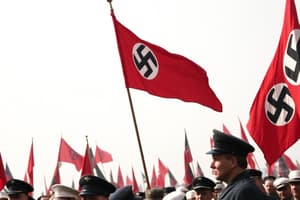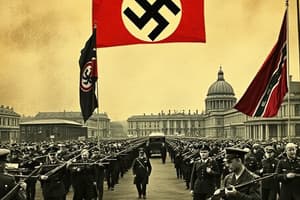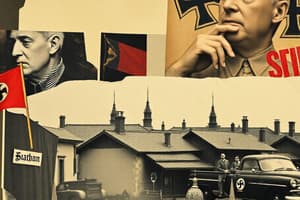Podcast
Questions and Answers
Why did the Japanese invade Manchuria?
Why did the Japanese invade Manchuria?
Because Manchuria was rich in iron and coal.
Why did Britain and France take no action against Italian aggression?
Why did Britain and France take no action against Italian aggression?
They were trying to avoid war.
Why did isolationists want the Neutrality Acts passed?
Why did isolationists want the Neutrality Acts passed?
They wanted to stay out of another war and European affairs.
What were some effects of Hitler's invasion of the Rhineland?
What were some effects of Hitler's invasion of the Rhineland?
What were the immediate results of Japan's invasion of China?
What were the immediate results of Japan's invasion of China?
Why was the Munich Conference considered unsuccessful?
Why was the Munich Conference considered unsuccessful?
How did other countries help Franco's Nationalist forces?
How did other countries help Franco's Nationalist forces?
Why did Stalin sign an agreement with Fascist Germany?
Why did Stalin sign an agreement with Fascist Germany?
What did Germany and the Soviet Union agree to in their secret agreement?
What did Germany and the Soviet Union agree to in their secret agreement?
What strategy did Hitler use to conquer Poland?
What strategy did Hitler use to conquer Poland?
What was Hitler's plan for conquering France?
What was Hitler's plan for conquering France?
What happened at Dunkirk?
What happened at Dunkirk?
What was the outcome of the Battle of Britain?
What was the outcome of the Battle of Britain?
What was the significance of the siege at Tobruk?
What was the significance of the siege at Tobruk?
How did Hitler's invasion of Russia compare to Napoleon's invasion?
How did Hitler's invasion of Russia compare to Napoleon's invasion?
Flashcards are hidden until you start studying
Study Notes
Japan's Expansion in Asia
- 1931: Japan invaded Manchuria due to its abundant iron and coal resources, fueling Japanese industrial growth.
- 1937: Japan launched a full-scale invasion of China, leading to significant Chinese casualties, including the death of thousands of civilians.
Italian Aggression in Africa
- 1935: Mussolini invaded Ethiopia, marking Italy's imperial ambitions.
- Britain and France chose inaction against Italian aggression to avoid conflict, reflecting a policy of appeasement.
- The U.S. Congress enacted the first of three Neutrality Acts, driven by isolationist sentiments to prevent involvement in European wars.
German Militarism and Expansion
- 1936: Hitler's troops moved into the Rhineland, violating the Treaty of Versailles; this action increased Hitler's power and marked a territorial expansion for Germany.
- 1938: The Munich Conference was held but deemed unsuccessful as it failed to address German expansion in Czechoslovakia and Poland.
The Road to World War II
- 1939: Franco became the Spanish dictator as Nazi Germany and the Soviet Union signed a Non-Aggression Pact, consolidating their control in Europe.
- Under the Non-Aggression Pact, Germany and the Soviet Union agreed to divide Poland, leading to the invasion of Poland by Hitler in September.
- Hitler employed the "Blitzkrieg" strategy, effectively utilizing rapid attacks by air and ground forces to overwhelm Polish defenses.
Key Events of 1940 and Beyond
- 1940: In April, Hitler invaded Denmark and Norway; by June, France surrendered to German forces.
- The German Luftwaffe commenced bombing campaigns over British cities in September, while Italy launched its campaign to seize Egypt and the Suez Canal.
- The rescue mission at Dunkirk succeeded in evacuating trapped British and French troops, with approximately 330,000 soldiers saved.
Warfare and Strategy
- The outcome of the Battle of Britain demonstrated Britain's resilience; Hitler abandoned plans for an invasion after failed bombing campaigns.
- In February 1941, Hitler sent Rommel to assist Italian forces in North Africa, striving for control over Egypt and the Suez Canal.
- In June 1941, Hitler invaded the Soviet Union, facing fierce resistance and employing brutal siege tactics, particularly evident in Leningrad, which caused heavy casualties among both military and civilian populations.
Comparison to Historical Events
- Hitler's invasion of the Soviet Union drew parallels to Napoleon's failed campaign, with both forces encountering severe resistance and logistical challenges on Russian soil.
Studying That Suits You
Use AI to generate personalized quizzes and flashcards to suit your learning preferences.





